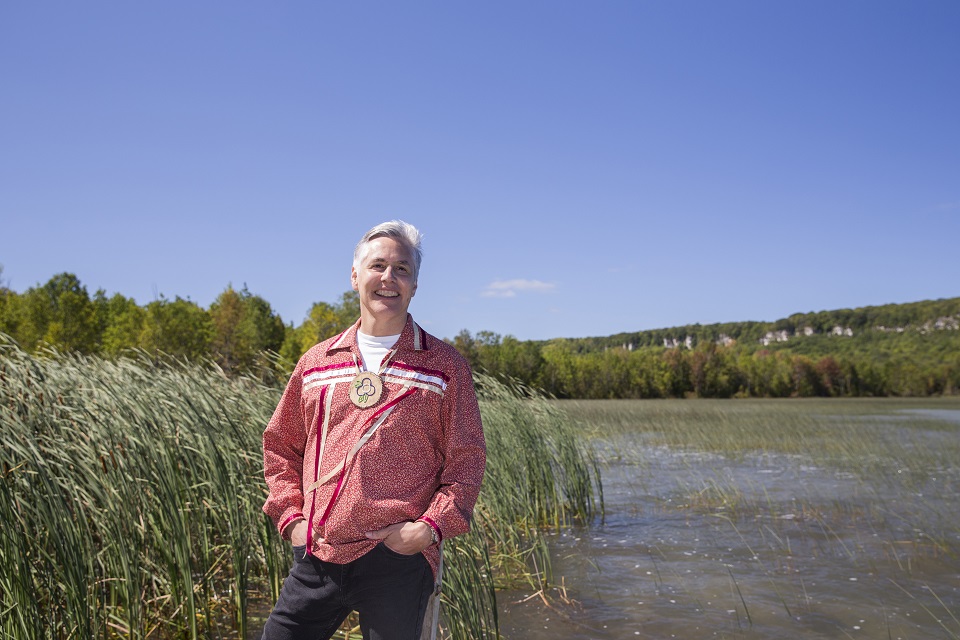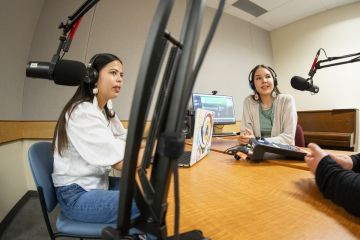Expert Q&A with John Borrows on Indigenous health and economic prosperity
- Julie Sloan

John Borrows, Canada Research Chair in Indigenous Law at the University of Victoria and a recipient of the 2020 Governor General’s Innovation Award, talks about how Indigenous laws and governance systems are helping to protect First Nations during the COVID-19 pandemic and how they are providing a way forward for a healthier and an economically stronger future.
Borrows is co-founder of the world’s first Indigenous Law Degree at UVic and author of Indigenous Peoples and International Trade (Cambridge University Press, June 2020).
Q. How are Indigenous laws and protocols protecting First Nations communities during the COVID-19 pandemic?
A. First Nations have acted in accordance with their own laws and protocols related to the care, love and protection of one another by organizing the delivery and distribution of food, closing non-essential band services and providing aid and support for their members, and by securing their members’ safety by erecting checkpoints at reserve entry points that limit access to all but emergency service providers.
It’s heartening to see Indigenous communities use their governance powers in these ways through their own customs and traditions. Some communities have passed legislation and others use clan-based ways to enhance safety, peace and order. Self-determination is a key activity for First Nations and the fact that it is being visibly and successfully implemented on a daily basis throughout the country over the past four months bodes well for the future.
Q. What are the consequences of governments’ lack of attention to the specific needs of Indigenous peoples?
A. First Nations in Canada have exercised extreme caution during the COVID-19 pandemic because many of their members have pre-existing conditions that make the virus even more dangerous. In addition, homes are often overcrowded and medical care is inaccessible for many communities. While First Nations in Canada have staved off the worse of COVID19 for the moment, the experience of the Navajo Nation in the US shows us that things can take a turn for the worse very quickly.
Throughout my 30-year career I have watched with horror what happens when governments ignore Indigenous peoples and do not respect or provide financial aid for Indigenous territories and decision-making. The high rate of infection and death in Brazil's Indigenous communities is a humanitarian disaster made even more tragic by official silence.
Q. What will be the biggest health challenges for First Nations as the pandemic continues?
A. I predict that circumstances will get worse before they get better, due to the entrenched structures that generally ignore, fail to prioritize, or reject First Nations’ laws and governmental power. One of the biggest challenges will be ensuring equality of access to vaccines and therapeutic drugs once they have been developed. With so many communities experiencing poor access to doctors or nurses in addition to generally weak medical infrastructure, there will have to be a significant prioritization and push to make vaccines accessible at the same rate as in the general population. We will have to repair broader discriminatory patterns by ensuring equal access to vaccines and anti-viral drugs as they are rolled out.
Q. What COVID-related conflicts have arisen between First Nations and other levels of government and how are they being resolved?
A. First Nations have worked with provincial and federal governments to coordinate care. But it is also important to note that there have been conflicts between First Nations and municipal, provincial and federal governments during this time too, as some First Nations feel they are not being heard when it comes to loosening restrictions related to travel and work in areas surrounding their communities. There is also concern that they are not being included in broader pandemic planning at other governmental tables. Some First Nations in BC, in particular, have been asking for more information about where confirmed cases are developing, so that they can be more proactive in responding to them. There will be a continued need for First Nations to take charge of their own borders and safety, even as they work with others.
Q. How are Indigenous laws and governance systems providing a way forward for the health and economic prosperity of First Nations?
A. Indigenous laws and governance are crucial to enhancing economic power and sustainability. I see a brighter future for Indigenous communities who harness the lessons they’re learning and demonstrating through the pandemic.
The Canadian federal government has earmarked more than $400 million to assist Indigenous businesses as they cope with the pandemic. Indigenous peoples have one of the highest rates of small business creation in the country. These funds will assist Indigenous entrepreneurs and communities in ensuring that they and their employees can get back to work as soon as practical.
Q. The new Canada-United States-Mexico Agreement (CUSMA) and the first Indigenous peoples’ rights exception came into force in July. How will CUSMA help create new economic opportunities?
A. CUSMA lays the groundwork for Indigenous communities to use their own laws and governance to build their economies within North American markets. The agreement enables traditional, handcrafted Indigenous textiles and other goods to be imported duty-free. While this might seem like a small matter, it is a significant opportunity for artisans and craftspeople within First Nations to expand their markets. Approximately two-thirds of Indigenous businesses are home-based and two-thirds use their personal savings to fund their economic activities and local communities’ laws and governments can help promote and incentivize this work.
CUSMA also provides for the growth and expansion of Indigenous business by calling on governments to increase trade, investment and collaboration. Indigenous governments can pass laws and incentivize investment and training for their citizens.
It is also important to note that CUSMA states that legal obligations to Indigenous people must be upheld. This means that Indigenous laws and governments cannot be eroded through international trade and investment as a whole.
Q. What are the greatest growth sectors for Indigenous business?
A. In my view, environmental protection, sustainability and clean-up will be at the heart of a lot of future growth for Indigenous-owned small and medium-sized businesses. Indigenous peoples’ own laws will be crucial to the success of these ventures because they speak to the obligations Indigenous peoples have long had to the earth. Sustainable fisheries and responsible forest management also plays a vital role in Indigenous communities.
Photos
In this story
Keywords: Indigenous, health, economics, reconciliation, COVID, Research Accelerator Fund
People: John Borrows





